Trading Day: S&P/ASX 200 closes lower, travel stocks soar on vaccine news
Australia’s sharemarket slipped amid earnings reports as a further spike in US bond yields weighed on US futures, although commodity prices rose. Call for Crown royal commission. In earnings, Costa was strongest, Macquarie jumped after guidance boost.
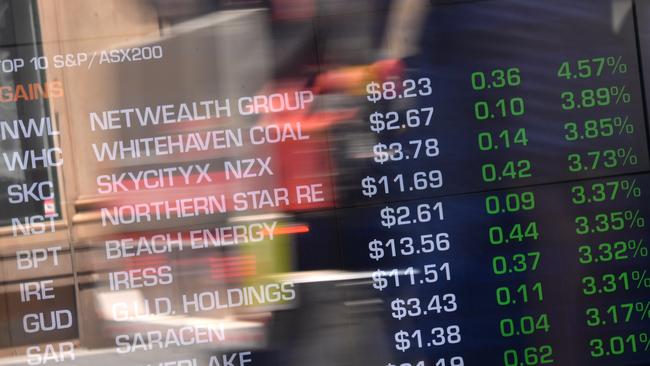
- Travel stocks up on vaccine news
- Covid hammers oOh!media profit
- Renos behind Reliance surge
- Beats and misses: earnings season so far
That’s all from the Trading Day blog for Monday, February 22. Australia’s sharemarket slipped amid earnings reports as a further spike in US bond yields weighed on US futures, although commodity prices rose. Earnings reports had mixed effects with Costa strongest in the ASX 200 after reporting. Macquarie jumped after boosting its guidance, while the major banks fell as Bank of Queensland raised $1.35bn to buy ME Bank from pension funds.
Eli Greenblat 6.54pm:Books flying onto shelves from Booktopia
Booktopia chief executive Tony Nash jokes that such was the massive demand for books through the worst months of COVID-19, which saw the retailer ship a record 4.2 million orders in the December half, that his company should consider starting a side business that sells bookshelves.
Meanwhile, the popular Booktopia Facebook site has been switched back on and reinstated after it along with many other retail sites and news organisations disappeared last week as a part of the social media giant’s decision to block news.
Mr Nash believes the enthusiasm for ordering books online isn’t just the result of the global health pandemic but a trend experienced overseas where there is a massive shift to online, with Australia now accelerating to catch up.
The tsunami in book sales, led by fiction, technical books, children’s books and manga graphic novels, has pushed into January and February — prompting Booktopia to believe the boom in 2020 was more than just a COVID-19 effect, and encouraging the recently listed book retailer to upgrade its revenue and earnings forecast for the full year.
Booktopia said on Monday strong ongoing demand from customers and increased distribution capacity helped Booktopia post a record first-half result for the December half and set it up for a bumper 2021.
On Monday, its share price lifted 0.4 per cent to $2.80.
6.21pm:Significant uncertainty remains for Ampol: Moody’s
“Significant uncertainty remains for Ampol over the duration of the pandemic impact on fuel demand, as well as the outcome from the review of its Lytton refinery, which should conclude by 30 June 2021,” says Ian Chitterer, Vice President, Moody’s Investors Service”.
“The recovery in jet fuel demand remains largely dependent on the reopening of international borders given international travel and freight represented over 75% of Ampol’s 2019 jet fuel volumes.
“From a credit perspective, Ampol has a publicly articulated and transparent capital allocation framework. Given that management has adhered to this framework to maintain Ampol’s balance sheet strength, we do not expect any material changes to its credit profile over the next 12 to 18 months.”
David Murray 6.13pm:Bitcoin money laundering arrest
NSW police have seized $1m in cash during the arrest of the alleged head of a crime syndicate accused of money laundering via Bitcoin.
Cybercrime Squad detectives swooped on Yi Zhong, 30, in a carpark in Strathfield, in Sydney’s inner west, at 5.30am Monday.
Officers allegedly found $1m in two black bags inside his vehicle.
In a later raid on his home in Wentworth Point, investigators allegedly seized more than 1kg of methamphetamine, cocaine, mobile phones, a laptop, electronic storage devices and cash.
The targeted swoop came after Cybercrime Squad established Strike Force Curns in October last year to investigate a crime syndicate involved in money laundering using cryptocurrency.
Police allege Mr Zhong directed the syndicate to launder money by converting cash into Bitcoin on his behalf, totalling $5,479,300.
Cybercrime Squad Commander Detective Superintendent Matt Craft said the group was operating as money launderers for hire.
“This is the first phase of arrests and it is anticipated further arrests will be made over the next four weeks as the evidence gathered is collated and assessed,” Superintendent Craft said.
“The message is clear - the fact you deal in cryptocurrency does not place you beyond the reach of the NSW Police Force.”
Mr Zhong was forced by police to lie face down on the ground to be handcuffed and searched. He was told he was being arrested for dealing in the proceeds of crime, before being taken to Auburn Police Station.
He was charged with offences including 19 counts of knowingly dealing with proceeds of crime with the intent to conceal, knowingly directing activities of a criminal group, supplying a prohibited drug and taking part in the supply of a large commercial quantity of a prohibited drug.
He appeared at Burwood Local Court and was refused bail, to appear at Central Local Court on Monday April 19
James Kirby 5.23pm:Tearaway Tesla helps to drive boom in copper
If you missed the money made in the iron ore boom, hold on — you might have a second chance with copper.
The world’s most commonly used industrial metal is rising rapidly as investment markets prices in a global recovery from the COVID crisis.
Long known to industry analysts as “Dr Copper” for its ability to act a bellwether for the health of the wider economy, this time round things are different in copper thanks to Tesla: the spectacular trading and fourfold increase in Tesla share price over 12 months has put a rocket under virtually all investments linked to electric vehicles, which use four times more copper than traditional petrol vehicles.
With a “tight” supply of copper mines — and a timeline of seven years to get a mine up and running — any extra demand is going to push the copper price higher: As for electric vehicle demand, it is expected to reach 3 million tonnes a year by 2030. Just now, the total global market is 22 million tonnes.
Tesla, by itself, will need 1.8 million tonnes of copper to reach its target of 20 million cars a year.
In other words copper, along with riding a traditional commodity upswing, is wide open to getting the premium currently offered to so-called battery metals such as lithium, nickel and cobalt.
Damon Kitney 5.02pm:Harold Mitchell resigns from Crown Resorts board
Former advertising magnate Harold Mitchell has resigned from the board of the James Packer-backed Crown Resorts with immediate affect, becoming the fourth director to step down in the wake of the damning findings of the Bergin inquiry, which recommended Crown was unsuitable to retain its Sydney casino licence.
The Australian understands Mr Mitchell tendered his resignation to new Crown executive chairman Helen Coonan on Monday afternoon, keen to ensure speculation over his future on the board did not become an ongoing distraction for the company.
Mr Mitchell was head of Crown’s remuneration committee and was working with search firm Korn Ferry to find new directors. His departure follows the resignations in the past fortnight of Andrew Demetriou, Guy Jalland and Michael Johnston from the board.
Another director, the late Kerry Packer’s doctor John Horvath, has also announced plans to leave the Crown board.
Until Monday Mr Mitchell had privately vowed it was only Crown’s investors who could remove him as a director and was eyeing the October annual meeting for a more graceful departure.
Crown’s biggest institutional shareholders Perpetual and Investors Mutual had last week urged him to resign from the board of the embattled gaming company.
The Bergin report recommended Mr Mitchell, who has been on the Crown board for over a decade, step down if a civil penalty or declaration was made against him in relation to the “minor breaches” he was found to have made as director of Tennis Australia.
The Victorian Commision for Gaming and Liquor Regulation Catherine Myers is also conducting an investigation into Mr Mitchell, who had been asked to explain how he was a suitable person to be an associate of Crown Melbourne.
READ MORE: Crown to face royal commission in Victoria,
Rachel Baxendale 4.59pm:Andrews calls Crown royal commission
The Victorian government has called a royal commission into Melbourne’s Crown casino.
Former Federal Court judge Raymond Finkelstein will lead the inquiry.
“This is about making sure that those who hold a casino licence in Victoria uphold the highest standards of probity and integrity — and that they’re accountable for their actions,’’ Victorian Premier Daniel Andrews said on Monday.
The commission, which will report by August 1, comes after a NSW inquiry concluded that the casino giant was unfit to hold a licence in Sydney.
4.40pm:ASX 200 ends -0.2%; bond yields spike
Australia’s sharemarket slipped amid earnings reports as a further spike in US bond yields weighed on US futures, although commodity prices rose.
The S&P/ASX 200 index closed down 13 points, or 0.2pc, at 6780.9 - its lowest daily close since Feb 4 - after losing almost 12 points in the closing match.
It came as S&P 500 futures dipped 0.3pc amid inflation jitters as US 10-year bond yields spiked 5.6bps to a 12-month high of 1.3925pc after rising 4bps on Friday after robust US and European economic data last week.
Australia’s 10-year bond yield surged 18bps to a 12-month high of 1.6180pc and the Australian dollar hit a 3-year high of 0.7908, weighing high PE stocks with US exposure.
Health Care and Tech stocks were weakest, with CSL down 2.4pc and Afterpay down 1.8pc.
The Financials sector also underperformed with the NAB down 2.2pc as Bank of Queensland raised $1.35bn to buy ME Bank from pension funds.
But Macquarie Group rose 3.4pc a hit a record high intraday after boosting its FY21 guidance on commodity trading revenue after the US cold snap.
QBE jumped 5.6pc after multiple upgrades and Costa Group surged 13pc after a strong earnings report.
The Materials sector was strongest with BHP up 3.3pc, Rio Tinto up 3.3pc and OZ Minerals up 7pc as LME copper surged 3.8pc to a record high of $US4.22 a pound.
Bridget Carter 4.14pm:Crescent Capital adds GS to IPO ticket
Crescent Capital has added Goldman Sachs to the ticket for the initial public offering of its Australian Clinical Labs business.
Goldman Sachs will join Bank of America in advising on the float.
David Ross 4.05pm:Daniel Grollo made redundant
Grocon CEO Daniel Grollo, along with all executives have been made redundant as part of the latest wave of administrations at the troubled building giant.
The departure of Mr Grollo from the business was confirmed by a Grocon spokeswoman.
Mr Grollo was among 20 staff who were made redundant two weeks ago, before the announcement made on Monday that 45 additional Grocon corporate entities would be placed into administration.
The departure of Mr Grollo ends the chain of members of the Grollo family started by scion Luigi Grollo.
Eli Greenblat 3.57pm:Lark Distillery in hot demand and warms to profit
Lark Distillery Co, the Tasmanian-based whisky maker, has rebounded to profit for the December half as its craft whiskies were in hot demand through the COVID-19 pandemic and its online platform proved a strong engine for sales of its limited release spirits.
Lark on Monday said that first-half profit was $542,436 from a loss of $743,321 in the previous corresponding period. Revenue for the half was up 91 per cent to $7.239 million.
The ASX-listed whisky producer said litres under maturation for the half increased by 106,236, or 14.9 per cent, with the company now holding whisky inventories that at maturation would be worth $113m.
In the first half it had strong five times year on year growth for online sales, while November saw a record for e-commerce sales of $488,000.
3.57pm:Lendlease results ‘credit negative’: Moody’s
“Lendlease Group’s interim results are credit negative and reflect still tough pandemic-induced conditions for its businesses,” says Matthew Moore, Vice President, Moody’s Investors Service.
“While the overall result is weaker than our prior expectations, the group’s performance improved materially from the previous half, as restrictions eased in many markets and the global recovery starts to take hold.
“Despite the soft results, we believe Lendlease’s balance sheet remains in a solid position, with gearing at the low end of its target range and strong liquidity levels.
“This, combined with likely higher earnings over the next 12 to 18 months as the group accelerates its large development pipeline, should allow it to achieve credit metrics more commensurate for the rating.”
Lachlan Moffet Gray 3.35pm:AFIC profit hit but dividend maintained
The Australian Foundation Investment Company has taken a hit to its interim profit but maintained its 10c a share interim dividend by digging into its reserves.
Half year profit almost halved from $146.1m to $84.1m as the listed investment company’s investment income fell from $164.1m to $95.2m.
The company’s income flows were rocked by the impact of COVID-19 on the ASX, and particularly dividend flows.
“The biggest reductions came from the major banks, BHP, Macquarie Group and Transurban, while a number of companies in the portfolio did not pay a dividend during the half,” the company said in its half year report.
However, AFIC’s portfolio rebounded with the market in the latter part of the year, with the portfolio up 15.2 per cent for the six months to December 31, just edging out the 13.7 per cent gain made by the broader ASX 200 index.
It means the total portfolio return in the 12 months to December 31 including franking was 5.8 per cent, compared to the ASX 200’s 2.4 per cent.
3.05pm:ASX fades as US bond yields spike
Australia’s sharemarket has faded intraday along with US futures as bond yields spike.
The S&P/ASX 200 was down flat at 6792 after bouncing from 6774 to 6814 earlier.
The intraday retreat came as S&P 500 futures swung from up 0.3 to down 0.3pc as US 10-year bond yields rose as much as 5.6bps to a 12-month high of 1.3925%
However commodity prices are strong with COMEX copper up 2.7pc, WTI crude up 1pc and Singapore iron ore up 1.5pc.
John Durie 2.49pm:Why won’t Canberra help companies prepare for the future?
BlueScope’s Mark Vassella is at the top of his game in steel making and also is managing expectations about the renewable future.
In unveiling record financial numbers Vassella appointed NZ Steel boss Greta Stephens as head of his climate change division showing his commitment to the challenge.
At the same time he confided his Port Kembla steel mill will need a new blast furnace around 2026 and rather than fast forwarding to green steel, his present plan is to spend $750m preparing an idled blast furnace to carry the load going forward.’
In other words, tweaks aside, BlueScope in Australia will be operating as usual.
In doing so, Vassella is presenting a reality check to all those talking up green hydrogen as the new feedstock for steel making.
The starting point is the new blast furnace needs to be ready by 2026 and even the optimists are talking about green hydrogen in 2030.
Then there is the long list of factors east coast manufacturers have to consider when looking at hydrogen, which is water and energy intensive.
Green hydrogen needs renewable power and plenty of water which, in the case of projects already in planning in the Pilbara, means massive solar farms and desalination plants.
It‘s not so simple as digging iron ore out of the ground.
1.55pm:Fonterra +4.3% at 2-year high
Fonterra shares have risen 4.3pc to a 2-year high of $4.61 in Australian trading to be up 13pc year to date. Some traders tip a strong result and dividend increase when the company reports on March 17 as it works through its debt reduction and business restructuring.
It comes after the NZ whole milk powder price recently hit a 6.5-year high.
Nick Evans 1.39pm:Payday for Rio Tinto’s former CEOs
Former Rio Tinto boss Jean-Sebastien Jacques will get a pay rise for 2020 despite losing his cash bonus for the year and being stripped of £1m ($1.8m) in long-term bonuses over the Juukan Gorge debacle, as former chief executive Sam Walsh gets another $17.6m deferred payout.
Rio released its annual report on Monday, saying it had paid another $17.6m to Mr Walsh from entitlements frozen in 2017 while anti-corruption authorities investigated a payment to a consultant on Rio’s Simandou iron ore project in Guinea.
Mr Walsh initially agreed to defer payments of his long-term incentive while investigations were conducted by regulators in the UK over the payments. The investigations are ongoing, but the two sides could not reach agreement over an extension of the deferments, and Rio said in March the payments would resume, including interest and dividends, after a dispute resolution ruled they could no longer be held up.
Bridget Carter 1.17pm:ANZ Bank ‘still interested’ in AMP
ANZ Bank is still believed to be circling AMP’s bank after being ousted in its efforts to buy ME Bank, which has been sold to Bank of Queensland for $1.325 billion.
Bank of Queensland confirmed details of its highly anticipated ME Bank acquisition on Monday, with the transaction to be fully funded through a $1.325bn equity raising at $7.35 per share through Goldman Sachs and UBS.
The group will secure $1bn through an entitlement offer and the remainder through an institutional placement at a discount of 12.6 per cent to the last closing share price of $8.41.
Bank of Queensland, advised by Luminis Partners, is understood to have been the frontrunner in the contest for days before the deal was announced.
Final bids in the Macquarie Capital-run competition were received about three weeks ago, say sources.
Also in the process to buy the bank had been ANZ as well as Bendigo and Adelaide Bank, as first reported by The Australian.
ANZ is known to have been an interested buyer in the AMP banking operation when the financial group’s advisers and suitor Ares Management first started testing interest.
DataRoom revealed it had made an offer for AMP bank, but the understanding is that its offer was below AMP’s price expectations.
Some have also questioned whether such a transaction would receive approval from the Australian Competition and Consumer Commission which has kept close tabs on the top four banks in connection to their level of pricing power over customers.
Sources say that AMP had been hoping to achieve a price of 1.3 times the bank’s book value, and with the Bank of Queensland deal struck at 1.05 times ME’s book value, the thinking is that AMP may now look to adjust its initial price expectations.
1.14pm:Petrol higher, used car prices falling: CommSec
Last week the national average price of unleaded petrol rose by 2.2 cents a litre to 131.2 cents per litre (c/l) according to the Australian Institute of Petroleum.
According to the Datium Insights, used vehicle prices fell 2.8 per cent last week.
The Australian Bureau of Statistics released its January survey of Aussie households.
While most respondents expect spending to remain the same over the next four weeks, more expect spending to fall than rise across all categories except motor vehicle costs (including fuel) and recreation/leisure activities, notes CommSec chief economist Craig James.
“One positive for motorists is that the higher Aussie dollar is working to restrain local pump prices.
“While the supply of used cars remains low, there was some improvement in availability last week, putting downward pressure on prices. Over the past year, used vehicle prices are up around 36 per cent.
“With the price gap between used and new cars narrowing, some buyers are being attracted to the latter, attracted by long warranty periods. Still, low availability of stock affects new vehicles as well as used,” says James.
12.56pm:Soft outlook for China’s property sector: CBA
Commonwealth Bank’s Global Markets Research team sees a soft outlook for China’s property sector.
“The property sector, mainly construction and land purchases, is critical to the Chinese economy. We estimate property investment directly contributes about 9pc of Chinese GDP. Furthermore, China’s property sector drives demand for output in other Chinese industries and other economies. It is also a key consumer of Australian iron ore exports.
“The rapid rebound in property investment was a key driver underpinning China’s V‑shaped recovery in 2020. However, the rapid property price appreciation, particularly in tier one cities, prompted regulators to focus on reducing leverage and curbing speculation.
Chinese authorities’ has set a path on tightening measures and a wave of macro‑prudential policies is part of policymakers’ efforts to build a stable property market, CBA says.
“Developing a rental market for homes is the policy focus. More supportive efforts in this area will follow in the 14th Five Year Plan (FYP).
“Looking ahead, we expect a gradual normalisation in monetary policy following a strong economic rebound in China. In our view, the slow downtrend in credit growth will continue in 2021. We expect the People’s Bank of China (PBoC) to maintain its key policy rates unchanged this year, including the 1‑year Medium‑Lending Facility (MLF) rate, the 7‑day reverse repo rate, and the Required Reserve Ratio (RRR).”
12.10pm:ASX up 0.3pc amid earnings, vaccine focus
Australia’s share market rose slightly in early afternoon trading amid focus on corporate earnings and COVID vaccine news.
The S&P/ASX 200 was up 0.3pc at 6814 after being confined to a range of 6774.3 to 6824.8.
S&P 500 futures rose 0.2pc as WTI crude oil futures gained 1.1pc, helping the Australian market recover intraday.
The Materials sector was strongest with BHP up 2.9pc, Rio Tinto up 3pc and OZ Minerals up 7pc as LME copper rose 2.1pc to a fresh record high after surging 4.4pc on Friday.
Costa Group surged 12pc on strong results and Macquarie was up 3.7pc after upgrading its FY21 earnings guidance.
Webjet soared 10c, Corporate Travel rose 8pc, Qantas rose 2.7pc and Sydney Airport was up 2.7pc as COVID vaccinations started in Australia.
Sentiment about economic reopening was helped by reports from overseas showing the Pfizer vaccine was highly effective and can be more easily transported than first thought.
Perry Williams 12.01pm: Ampol defends subsidy refusal
Fuels retailer Ampol has defended not taking up the Morrison government’s interim fuel subsidy after its Lytton refinery in Brisbane sunk to a $145m annual loss.
Canberra offered refiners a minimum payment of 1c per litre for production of petrol, diesel and jet fuel from January 1 under an accelerated subsidy designed to bridge the gap until a long-term package kicks in by July 1.
Ampol declined to take up the offer as it weighs the future of Lytton but JP Morgan analyst Shaun Cousins questioned why the company had decided not to collect money from the government.
“We felt it wouldn’t be appropriate to take the short-term support until we have concluded our review in the second quarter,” Ampol chief executive Matt Halliday. “To the extent that our decision was to continue operating the refinery we’d absolutely be in discussions with government around short and long-term support. But what we have said is until we complete our review, we don’t think it’s appropriate to take that money.”
Ampol’s rival, Viva Energy, has previously forecast the refinery production payment will contribute $30m to its underlying earnings for the six months from January 1, 2021 through June 30.
Two other refineries, BP’s Kwinana plant and Exxon’s Altona facility, will shut this year with Ampol weighing up how those closures will change the domestic industry and level of fuel imports into Australia.
“For instance BP moving to import in Brisbane reduces the size of our market position in Queensland and we need to work through what the arrangements are with Exxon,” Mr Halliday said.
11.51am:Dividend hope after earnings’ ‘blistering’ start
Earnings season is exceeding JP Morgan’s elevated expectations, says its head of Australian research, Jason Steed.
“The breadth and momentum in earnings expectations augured well for the Feb-21 results season,” he says. “Indeed, that has proved to be the case, with the rate of beats thus far running at a record high rate of 53 per cent.”
This “blistering start” to the season has seen EPS and DPS revisions of 4.4pc and 7pc respectively for the month to date.
This is the fastest pace of upgrades EPS and DPS for the month to date in his data going back 20 years.
“With operating conditions improving markedly across multiple sectors, boards have moved quickly to reinstate more generous payout ratios,” Mr Steed says.
“This move heralds, in our view, the early stage of an Australian dividend supercycle.”
He notes that the breadth in DPS revisions has been very strong, highlighting the underlying ‘health’ of the dividend recovery.
In fact Australia is “well ahead of the globe on dividends per share revisions” so far this year.
Leading the pack are the top 50 companies, reflecting the strength of revisions for the banks and miners in particular.
“Both sectors are benefiting from improving tailwinds, which will support earnings and higher payout ratios,” Mr Steed says.
Early signs of this trend are evident in sector-level revisions which show these sectors, along with Energy, leading positive dividends per share revisions in the year to date.
“Looking forward, particularly for Banks, Energy and Financials, the trends look strong; so strong, in fact, that we believe an Australian dividend supercycle is in the offing,” Mr Steed says.
His “Super ‘Dividend’ 7 stocks are: FMG, CHC, RIO, SUL, BHP, ANZ and NAB.
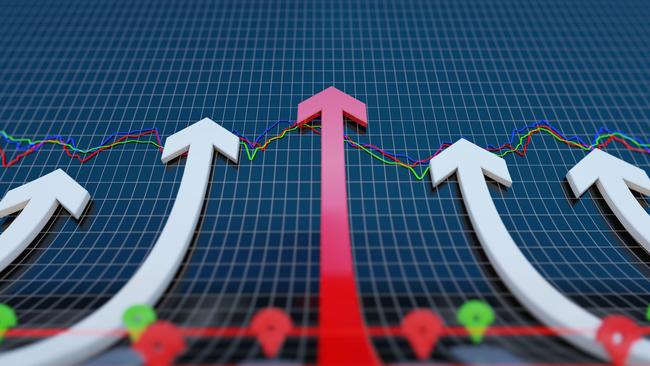
11.32am:BoQ guidance implies upgrades: GS
Goldman Sachs’ Andrew Lyons says Bank of Queensland’s earnings upgrade implies a 6pc upgrade to the consensus estimate for pre-provision operating profit for FY21.
He says its guidance for interim positive jaws (revenue versus expenses) of 1pc and charge for bad & doubtful debts of 10bps implies cash 1H21 cash net profit growth of 8-10pc versus the previous corresponding period.
That implies 7pc upside to the consensus estimate for 1H21 pre-provision profit and 28pc upside to the consensus estimate for cash earnings.
BOQ remains in a trading half for a $1.35bn capital raising at $7.35a share to fund its purchase of ME Bank for $1.325bn, which it says will be about 10-15pc EPS accretive.
11.19am:Travel stocks up on vaccine news
Australian travel stocks are outperforming after positive news on COVID-19 vaccinations over the weekend.
Webjet is up 6.9pc, Corporate Travel is up 4.8pc, Flight Centre has risen 3pc, Qantas is up 2.6pc and Sydney Airport is up 2pc.
As well as the start of vaccinations in Australian, preliminary reports from Israel showed the Pfizer-BioNTech vaccine was 89.4pc effective a preventing infection and 99pc effective at preventing deaths from the virus.
Separately, new results suggested the vaccine no longer needs to be kept a super-cold temperatures, making it easier to distribute.
Lilly Vitorovich11.03amGuardian Australia secures Google deal
Guardian Australia has secured a multi-year deal with Google for its Showcase product following similar deals with News Corp, Nine Entertainment and Seven West Media.
No financial terms have been disclosed, but The Australian understands that the deal represents a substantial proportion of the news publisher’s investment in journalism.
Public broadcasters ABC and SBS are also talking to Google about similar agreements to provide content for the tech giant’s Showcase product, which was launched locally at the start of the month.
Google’s push to lock in deals with Australian publishers comes as the federal government pushes ahead to pass the mandatory media bargaining code by the end of the month.
In stark contrast, Facebook last Thursday switched off domestic news feeds, along with public health, weather, charity and community pages, for Australian users of the service.
The surprise move triggered a government and public backlash, with the Morrison government yanking a major vaccine advertising campaign from Facebook.
10.50am:Expect Costa upgrades: Citi
Citi analyst Craig Woolford expects Costa shares to be “well supported” by a “very good FY20 result”.
Mr Woolford expects consensus upgrades of 3-6pc for FY21 after Costa reported better than consensus earnings and strong demand and pricing so far this year.
He notes strong revenue growth from avocados and citrus revenue and lower net debt as positives along with a 64pc increase in the full-year dividend.
Negatives include the prospect that free cash flow will normalise with higher taxes going forward, as well as challenges for mushroom revenue.
“Near-term, understanding the transitory effects on pricing and demand from COVID-19 will be important,” he says.
“Looking to the long-term, the company is looking to grow its scale in citrus and develop new growing techniques in avocados.
In addition, the balance sheet is positioned for bolt-on acquisitions as well.”
CGC shares were last up 9.6pc at $4.40 after rising 13pc to a record high of $4.54.
10.30am:ASX slips 0.2pc after early rise
Australia’s share market turned down slightly after an opening rise amid strong earnings reports and commodity price gains.
The S&P/ASX 200 was down 0.2pc at 6780 after an opening rise to 6825.8 led by the materials sector.
Health Care led declines with CSL down 2.7pc and Cochlear down 2.5pc after the Aussie dollar hit a 3-year high.
BHP rose 3.3pc and OZ Minerals was higher after LME copper rose 4.4pc on Friday.
Costa led gains with a 12.5pc rise to a record high of $4.51 after reporting strong revenue and increasing its dividend.
Macquarie was up about 3pc after rising 4.5pc to a record high of $48.39 after boosting its FY21 earnings guidance.
QBE Insurance rose 6pc and Goodman Group rose as much as 3.5pc after multiple brokers upgraded their ratings.
Lachlan Moffet Gray10.20am:Rex revamps flights, cries foul at Qantas
Regional Express (Rex) airlines will revamp its regional route network “in response to aggressive predatory moves by Qantas into thin regional routes serviced by Rex”, and has called on the ACCC to take enforcement actions against the national carrier.
Deputy Chairman John Sharp said Qantas has in recent months established competing services in routes serviced only by Rex and only capable of supporting one carrier.
“Qantas has clearly embarked on a deliberate strategy of moving into Rex’s routes that can only support one regional carrier in an attempt to intimidate and damage Rex in its traditional regional market, hoping that Rex would be a less formidable competitor in the domestic market,” he said.
Mr Sharp said that Rex would “stand its ground” and not withdraw from these routes, but to do so the airline would have to cancel the following services by the end of March: Sydney - Bathurst, Sydney - Cooma, Sydney - Lismore, Sydney - Grafton, Adelaide - Kangaroo Island.
However, Rex will also move into markets where Qantas is the sole operator like: Sydney - Coffs Harbour, Sydney - Port Macquarie.
And potentially: Sydney - Tamworth, Perth - Geraldton, Melbourne - Devonport, and Sydney - Canberra.
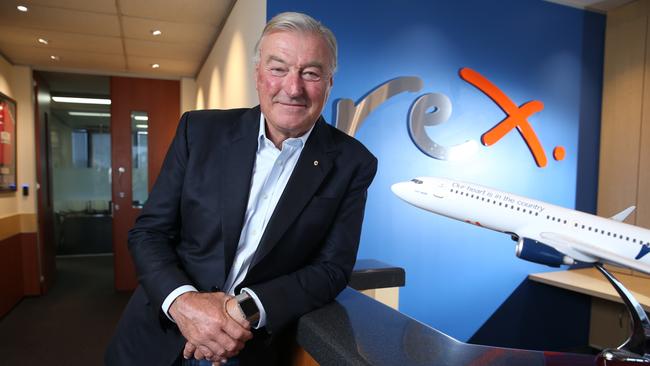
Jared Lynch 10.07am: Pandemic slows NIB revenue
COVID-19 has put the brake on NIB’s revenue, with a delay on premium increases halting income growth for the Newcastle-headquartered group.
Premium income rose 2.2 per cent to $1.1bn in the six months to December 31. But Chief executive Mark Fitzgibbon said premium revenue would have jumped 4.2 per cent had the NIB not delayed the annual 2020 premium hike for six months.
Overall NIB’s total revenue fell 1.1 per cent to $1.3bn, while net profit jumped 16 per cent to $66.3m in the half year to December 31.
It is set to reinstate annual premium increases on April 1 after Health Minister Greg Hunt approved a 4.36 per cent rise for the group.
Joyce Moullakis 10.00am:BoQ confirms ME Bank purchase, raise
Bank of Queensland’s purchase of ME Bank will create a lender with more than $88bn in assets, in what chief executive George Frazis is labelling a “defining acquisition”.
BoQ announced the landmark deal - worth $1.325bn - on Monday, alongside a capital raising of $1.35bn to fund the transaction, after it was foreshadowed by The Australian.
The capital raising will see the bank issue new shares at $7.35 apiece, a 12.6 per cent discount to where the stock last traded on Thursday.
BoQ was engaging with investors to participate in the capital raising on Sunday, ahead of kicking off the transaction.
BoQ was advised by Luminis Partners, with Goldman Sachs and UBS acting as the bank’s brokers. Macquarie Capital was tending to ME Bank. Other bidders for ME included Melbourne-based ANZ and Bendigo and Adelaide Bank.
Set up in 1994, ME Bank is owned by 26 industry superannuation funds, but has never paid a dividend to its shareholders.
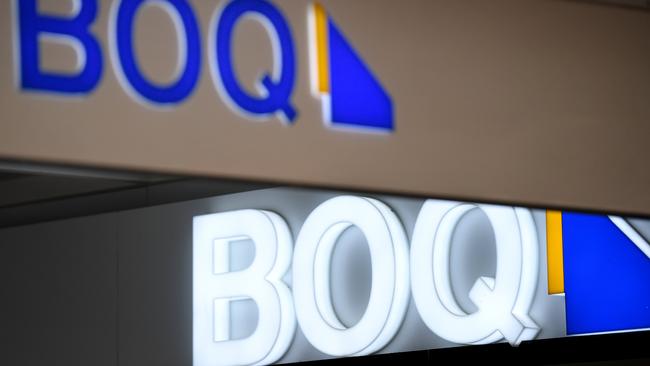
Lachlan Moffet Gray 9.55.am:Tyro loss after payments slip
Tyro Payments has recorded a $3.4m loss for the half year as the COVID-19 crisis saw fewer payments from higher-margin cards and a negative impact on small business loan originations.
Although transaction value lifted 9.5 per cent to $12.11bn, revenue slipped 2.1 per cent to $114.8m.
But EBITDA lifted 464.2 per cent to $8.5m due to increased gross profit in the payments business and a $4.5m JobKeeper benefit.
“Payments revenue was impacted by the card mix in the Tyro portfolio with the proportion of transaction value generated from higher merchant service fee (MSF) international credit cards,” the company said.
“Although payments revenue was down, gross profit was up 21.6pc from the higher margin generated from the increased transaction value from debit cards which carries a higher merchant acquiring fee margin compared to standard and international credit cards.”
“Revenue from the company’s banking business was down 20.5pc to $2.0 million. Revenue was directly impacted by the lower loan originations in the period due to the impacts of COVID-19 on merchant lending.
“Total loan originations from our merchant cash advance offering for the period came in at $2.6 million, down 93.0pc compared to $37.4 million in the pcp.”
Perry Williams9.50am:OSH starts Pikka FEED
Oil Search has started the engineering and design phase for its $US3bn Pikka oil project in Alaska as it seeks to add a new source of earnings growth from its mainstay Papua New Guinea gas business.
The first phase of the project aims to deliver 80,000 barrels of oil a day by 2025 at a breakeven cost of less than $US40 a barrel including a 10 per cent return.
The project was put on hold last year after COVID-19 sparked a steep fall in crude demand, leading to prices plummeting and forcing the producer to launch an emergency $US700m capital raising and slash jobs.
The Sydney-based company, best known for its PNG LNG export plant, is due to make a final investment decision in late 2021 on Pikka while a plan to sell down 15 per cent of its 51 per cent stake is also progressing.
“We recognise the importance of a successful selldown of a 15 per cent interest in the Pikka development area and on securing project level financing to fund at least 50 per cent of the initial Phase 1 project costs,” Oil Search managing director Keiran Wulff said.
“These two activities are a critical part of our capital management strategy which, combined with a strengthening energy demand outlook for projects with low breakevens and low emissions intensity, will provide confidence in our ability to make a final investment decision later this year.”
9.44am:ASX set to slip amid earnings reports
Australia’s share market is set to weaken based on offshore leads as earnings season continues.
Friday night futures relative to value suggest the S&P/ASX 200 index will open down about 0.3pc, near 6774 points.
A break of Friday’s low at 6769.9 would mark the lowest point for the index in 2.5 weeks.
On Friday the S&P 500 fell 0.2pc as the US 10-year bond yield rose 4bps to a 12-month high of 1.336pc amid strong PMI data in Europe, the UK and the US.
While WTI crude oil fell 2.1pc to $US59.24 as Texas oil wells resumed output, LME copper surged 4.4pc to a record high of $US8,673 a tonne on signs of global economic growth and spot iron ore rose 3.3pc to $US174.45 a tonne.
BHP ADR’s equivalent close at $48.36 was 2.2pc above BHP’s close in London, but the Aussie dollar’s rise to a 3-year high of 0.7877 may weigh on companies outside of the resources sector with US dollar earnings.
Bitcoin surged to a fresh record high of $US58,350.4 and spot gold rose 0.5pc to $US1784.25 an ounce as the US dollar index fell 0.2pc.
Elsewhere the focus remains on earnings season with eight S&P/ASX 200 companies including BlueScope and Lendlease reporting today and more than 160 companies reporting this week.
QBE and Goodman Group shares should benefit from multiple ratings upgrades by brokers while Cochlear was also upgraded by Credit Suisse.
Macquarie should be a standout after predicting a rise in FY21 profit of up to 10pc after previously expecting it to be “slightly down”.
The S&P/ASX 200 fell 1.3pc to 6793.8 on Friday.
Bridget Carter 9.43am: Carlile quits Credit Suisse
The former Australian co-head of investment banking at Credit Suisse, Mark Carlile, has resigned from the Swiss bank.
Credit Suisse advised staff of his departure last Thursday.
Mr Carlile had been co-head of investment banking and capital markets at Credit Suisse between November 2018 and March 2020 after joining in 2010 from Morgan Stanley.
He was most recently vice chairman.
His departure comes after Duncan Mann left Credit Suisse last year to join JPMorgan as its co-head of industrial company coverage in Australia and New Zealand.
A number of other investment bankers have recently departed major financial firms to join new start-ups Barrenjoey Capital Partners and Jarden Australia.
In January, JPMorgan Australian investment banking co-head Jabe Jerram signed up with Barrenjoey along with Australian head of equity capital markets Dyson Bowditch.
They are following its head of real estate Rob Stanton out the door and its head of financial institutions Anthony Brasher.
Barrenjoey, founded by top former UBS operatives, has poached a raft of high profile UBS investment bankers, with more departures from the Swiss bank expected to follow.
Lachlan Moffet Gray 9.27am:Covid hammers oOh!media profit
Ad company oOh!media has swung to a $35.7m loss and suspended its full-year dividend after the impacts of COVID-19 on the outdoor advertising market saw revenue fall 34 per cent to $426.5m.
The company’s rail advertising assets were the hardest hit, down 82 per cent in the second half of the year, while its airline segment declined 65 per cent.
Street furniture declined 26 per cent, retail declined 24 per cent while road declined 19 per cent.
However, CEO Cathy O’Connor said the market is staging a recovery, with Q4 business at 70 per cent of what it was a year prior, up from 57 per cent for quarter three.
Revenue for January 2021 was 80 per cent of revenue for January 2020.
Perry Williams 9.24am:Ampol ‘uncertainty’ over jet fuel
Ampol sees “significant uncertainty” that international travel will resume in 2021, in a bearish signal for its jet fuel business that provides supplies to the airline industry.
Jet fuel volumes fell 56 per cent in the fourth quarter of 2020 on the same period a year earlier.
“Given the continued impact of COVID-19 on demand, Ampol’s current Australian volume expectations for 2021 are 13.5-14bn litres, with this forecast assuming a delayed recovery in jet fuel demand and the continued impact of domestic travel restriction,” Ampol said.
There is “significant uncertainty that international travel will resume in 2021.”
The hefty $145m loss for Ampol’s Lytton refinery saw earnings at its fuels and infrastructure plunge by two-thirds to $154m after fuel demand was smashed by COVID-19 last year.
Its convenience retail business delivered a strong performance, up 42 per cent to $287m over the 12-month period.
However, it also took an extra $337m writedown over the year reflecting higher costs for remediation obligations and the lower value of petrol station sites.
“Ampol has navigated a tough operating environment, with sustained weakness in refining margins, ongoing government restrictions impacting travel and aviation in particular, and broad economic weakness impacting demand throughout the year.”
Ben Wilmot 9.18am: McGrath hits top end of guidance on housing boom
Listed real estate agent McGrath is riding the bullish residential property market and hit the top end of its guidance range as it generated a first half profit of $8.1m.
McGrath chief executive Eddie Law said the residential property market had proved to be “very resilient” during the ongoing COVID-19 pandemic, compared with other sectors.
“Cashed up homeowners, many of whom are prevented from travelling either domestically and internationally, are now largely working from home and as such, are reassessing their lifestyle and surroundings. This is positive for our industry as it results in homeowners either transacting or improving the asset value of their current home,” he said.
The company’s revenue jumped 16 per cent to $56.7m as home sales accelerated and earnings before interest, taxes, depreciation, and amortisation turned around to $6.6m. It also benefited from $2.1m of JobKeeper and a $1.9m gain by converting a Parramatta business to a franchise.
McGrath could again turn to expansion as it has $24.6m of cash on its balance sheet and no borrowings, and it has already restarted paying dividends, by declaring a 0.5c per share interim dividend.
The company’s net profit of $8.1m was also a significant turnaround compared with last year’s $1m first half loss, and it is making better use of its network with a 23 per cent rise in sales per agent for the period, despite lower listing volumes in the market.
9.01am:What’s impressing analysts?
A2 Milk raised to Neutral: JPM
Cleanaway raised to Buy: Jefferies
Cochlear cut to Sell: Citi
Dalrymple Bay started at Outperform; $2.50 target price: CS
Event Hospitality raised to Buy: Citi
GWA Group raised to Hold: Morningstar
Goodman Group raised to Outperform: CS
Goodman Group raised to Overweight: JPM
Goodman Group raised to Outperform: Macquarie
Lovisa Holdings target price raised 16pc to $13.30; Neutral rating kept: Citi
OceanaGold cut to Neutral: JPM
OceanaGold cut to Neutral: JPM
Pact Group cut to Neutral: CS
QBE Insurance raised to Neutral: Macquarie
QBE Insurance raised to Buy; target price raised 10pc to $10.25: UBS
QBE Insurance cut to Hold: Morningstar
Lachlan Moffet Gray 8.54am:Bingo sees recovery as profit drops
Waste management company Bingo Industries’ board is yet to endorse CPE Capital’s takeover offer, but has handed down a lower half year profit, as it said the impact of COVID-19 on the business is lessening and a recovery is underway, ahead of schedule.
Revenue declined 1.5 per cent on the prior comparable period to $239.6m while underlying net profit after tax declined 58.5 per cent to $15.845m.
An interim dividend of 1.5 cents a share was declared, down from 2.2 cents.
Managing director and CEO Daniel Tartak said despite a softening of markets and margins through the pandemic, the company was well positioned to benefit from government stimulus.
“We expect to benefit from the strong infrastructure pipelines in NSW and VIC, before a recovery in the residential and non-residential markets over the medium term. C&I volumes are also set to increase with reduced restrictions and the wider workforce moving back to offices in the short term,” he said.
Perry Williams 8.50am:Lytton still at risk as Ampol profit slumps
Fuels retailer Ampol is still weighing up the potential closure of its Lytton refinery in Brisbane after warning of a challenging outlook amid a steep fall in annual profits.
Half of Australia’s remaining refineries will close this year, heaping pressure on the only two left standing to commit to their future.
While Viva Energy is hopeful of keeping its Geelong plant alive, Ampol said it was still considering the future of Lytton which suffered a $145m loss for the 2020 financial year.
“Heading into 2021, we remain focused on cost and capital efficiency and will continue to make decisions to improve returns and deliver growth to shareholders. Our refining review is ongoing, with an outcome to be communicated to stakeholders in 2Q 2021,” Ampol chief executive Matt Halliday said.
Ampol’s annual net profit on a replacement cost basis declined by 38 per cent to $212m, beating a consensus estimate from analysts of $207m.
Earnings before interest and tax using the same replacement cost metric fell by a third to $401m, just shy of a $405m consensus figure.
Its dividend also eased for a final payout of 23c a share.
“Market conditions in early 2021 continue to be challenging, with headwinds including Australian dollar strength impacting F&I earnings and ongoing COVID-19 related travel restrictions impacting fuel volumes,” Ampol noted.
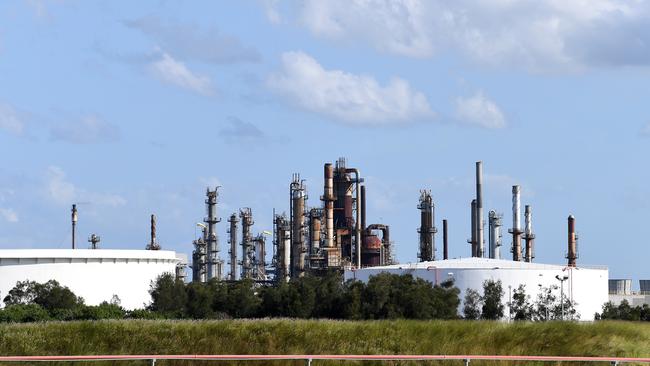
Lachlan Moffet Gray 8.47am:Booktopia lifts guidance on revenue rise
ASX newcomer and online book retailer Booktopia has lifted guidance after it reported a revenue increase of 51 per cent as customer and order numbers increased throughout the pandemic.
The company said it recorded revenue of $112.6m in the six months to December 31 while EBITDA lifted 502.3 per cent to $8m, adjusted for IPO costs.
Active customers lifted 25 per cent to 1.71m while 4.2m orders were shipped, an increase of 1m on the prior comparable period.
Full year revenue forecast was lifted 6.4 per cent to $217.6m and EBITDA was increased 36.3 per cent to $12.9m.
The loss for the group, after providing for income tax, amounted to $19.7m, driven by the conversion of preference shares and $4m of IPO costs
Joyce Moullakis8.43am: Macquarie upgrades profit forecasts
Macquarie Group has delivered a strong upgrade to its annual profit expectations, pointing to 2021 earnings printing as much as 10 per cent higher than last year.
In an ASX statement on Monday, Macquarie guided that profit for the year ended March 31 would be 5 per cent to 10 per cent higher than 2020’s $2.73bn.
The asset management and investment banking giant’s prior guidance - handed down earlier this month - was for this year’s profit to be “slightly down” on 2020.
Macquarie cited extreme weather in the US as having “significantly increased” client demand in its commodities and global markets division.
Lachlan Moffet Gray 8.32am:Costa thrives in lockdowns
Fruit and vegetables giant Costa Group has more than doubled its full year profit as the impact of the 2019 drought recedes and after grocery sales boomed throughout the COVID-19 lockdowns.
The company booked revenue of $1.164bn, up 11.2 per cent on the prior year, while recording a net profit after tax of $59.4m, up 108.4 per cent.
The company declared a final dividend of 5c a share, up from the 2c declared at the end of 2019.
CEO Harry Debney said the result was underpinned by price premiums and volumes of certain fruits like berries, with Arana berry production doubled.
“There were favourable market conditions in CY20 supported by positive demand and pricing across a number of our produce categories, including citrus, berry, and avocado,” he said.
“Our superior blueberry IP, in particular our premium Arana variety, meant we were able to sell increased volumes while also receiving a significant price premium.”
The company’s export China, although impacted by COVID-19 supply chain interruptions, still performed strongly.
The company announced it had begun planning the development of a large-scale packing facility in Mildura, Victoria, as part of a bid to expand citrus production in the region.
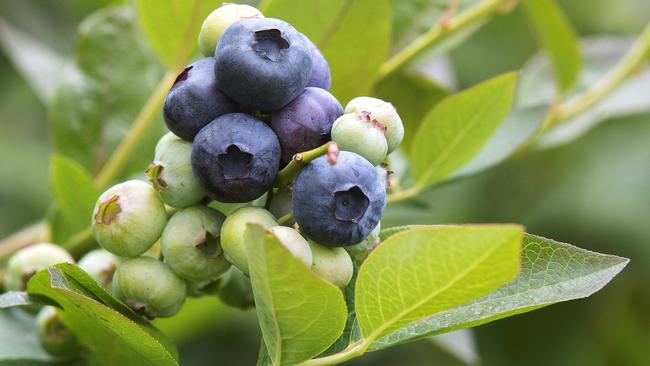
8.24am:Lendlease profit down as pandemic still weighs
Lendlease said activity in its key business areas remained below levels prior to the coronavirus pandemic, after reporting a 37pc drop in half-year net profit.
Lendlease reported a net profit of $196 million for the six months through December, compared to $313 million a year earlier. The company said its revenue fell 30pc to $5.21 billion.
Directors of the company declared an interim dividend of 15.0 cents a security, down from 30.0 cents a year earlier.
“The group has displayed resilience through a very testing period with a recovery in operating conditions gathering momentum toward pre-Covid-19 levels,” said Chief Executive Steve McCann. “Core operating Ebitda was $405 million, a significant improvement from the second half of fiscal 2020, although lower than the $525 million in the first half of fiscal 2020.”
Mr. McCann said market weakness had enabled it to secure more urbanisation projects, including a New York block where it intends to build apartments for rents and an apartment-and-office development in Los Angeles.
“While progress was made on converting opportunities across the group’s urbanisation pipeline, uncertainty continued to affect both tenant demand and investment partner appetite in the office sector,” Mr. McCann said of the company’s development division.
Lendlease’s development pipeline is now worth $110 billion, and the company said it was confident of being able to convert more than $20 billion of that work by the end of the 2023 fiscal year, despite ongoing uncertainty created by the pandemic.
“Along with development work in progress of $12.2 billion, successful conversion of the pipeline will support the group’s annual production target of more than $8 billion,” Lendlease said.
The company added that as much as $14.5 billion in revenue was backlogged in its construction division, with $11.8 billion for external clients.
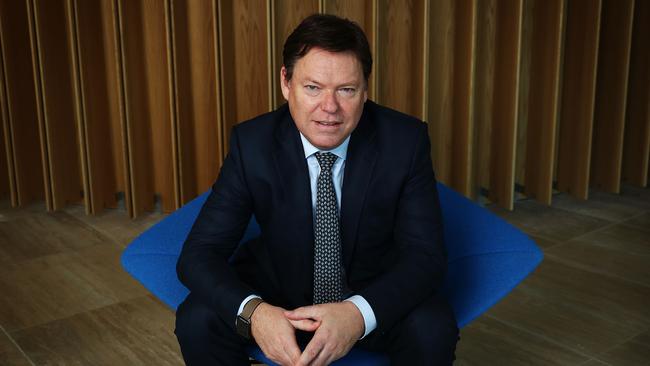
Dow Jones Newswires
8.19am:Earnings guidance, dividends show confidence: MS
The return of outlook statements and dividends in the February reporting season are giving analysts the confidence to expect a faster improvement in earnings in the coming years, according to Morgan Stanley Australia equity strategist, Chris Nicol.
With the earnings season 72 per cent complete by market capitalisation, Mr Nicol notes that 90 per cent of results have either beaten or met consensus estimates.
Earnings “beats” have exceeded “misses” by a factor of 4.4 times, dividend beats have risen to 53 per cent - the most in several years - and the number of companies providing earnings guidance has risen to 53 per cent, up from 38 per cent a year ago.
The consensus now expects a 14pc rise in FY21 earnings per share, having risen 9 per cent since the start of the reporting period.
But the consensus estimate for FY22 EPS is still 12 per cent below pre-Covid expectations after rising from 15 per cent at the start of January.
“We expect to see this gap continuing to close over the next 6-12 months,” Mr Nicol says.
Lachlan Moffet Gray 8.13am:Home renos behind Reliance profit surge
Global home and bathroom fixtures business Reliance Worldwide has almost doubled its half year profit following a boom in demand for home renovations during the pandemic.
The company said sales increased 13 per cent to $642.4m on the prior corresponding period while reported net profit after tax rose 82 per cent to $91.4m as cost reduction initiatives lifted margins.
An interim dividend of 6 cents a share was declared, up 33 per cent on the prior period.
The American division was the strongest performing with sales up 22 per cent on a constant currency basis, while Asia Pacific and European, Middle East and African sales lifted by 10 per cent.
Sales in Australia were assisted by new home builds.
The company also reduced net debt by $76.2m to $226m in the period.
The company did not provide formal guidance for the full year but CEO Heath Sharp said January sales had been strong.
“Sales on a constant currency basis were 14 per cent higher than for the same month last year and 24 per cent higher on a daily sales basis,” he said.
“We have continued to see positive sales growth in all regions during the first half of February”.
7.50am:BlueScope profit jumps 78pc
BlueScope Steel recorded a 78pc jump in first-half net profit and projected stronger earnings in the second half, while signalling a potential reline of a blast furnace at its Port Kembla steelworks.
The steelmaker reported a net profit of $330.3 million for the six months through December, up from $185.8 million in the same period a year earlier.
Underlying earnings before interest and tax totalled $530.6 million, up 75pc year-on-year. BlueScope, which reported robust order and dispatch rates and strong steel spreads, said it expects second-half underlying Ebit in a range of $750 million-$830 million.
Directors declared an interim dividend of 6 cents a share, flat on a year ago.
Dow Jones Newswires
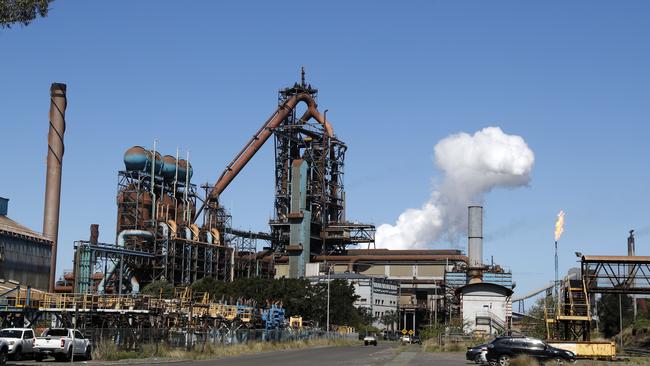
7.40am:Chorus profit sinks 23pc
NZ telecom infrastructure provider Chorus has posted a 23 per cent fall in first half net profit to $NZ24m.
It declared an interim dividend of NZ10.5c per share.
Chorus said the fall in profit largely reflected the migration of customers from legacy copper services to alternative networks, particularly in non-Chorus fibre network areas.
Full-year FY21 EBITDA guidance was unchanged, tracking towards the lower.
Capital expenditure guidance range has been increased to $NZ670 million to $NZ700 million.
Cliona O’Dowd 7.10am:ASX tipped for lower start
The Australian sharemarket is expected to open lower on Monday following weak overseas leads, with energy and iron ore miners likely to weigh.
SPI futures are pointing to an 11-point decline at the open as investors take their cues from Wall Street’s lacklustre end to the trading week on Friday.
The Australian dollar is sharply higher at US78.67c, after a fall in the greenback.
Heading into the weekend, the Dow Jones ended flat at 31,494.32, the S&P 500 finished down 0.2 per cent at 3906.71 and the Nasdaq rose 0.07 per cent to 13,874.46.
“One of the factors that will keep our market a little bit on the softer side is that the oil price was hit by some profit taking,” CommSec chief economist Craig James said.
“We also had the iron ore price down on Friday. So both of those will weigh on stocks at the start. We’re also moving into the time of the year when companies go ex-dividend. So that may influence the market as well.”
Global oil prices retreated 2 per cent on Friday. Brent crude fell 1.6 per cent to $US62.91 a barrel, while the US Nymex slipped 2.1 per cent to $US59.24 a barrel.
Iron ore fell 1.3 per cent to $US172.20 a tonne, but rose 3.8 per cent over the week.
“On the positive side, base metal prices continue to rise, with the tin price up almost 6 per cent and a gain of over 4 per cent for copper,” Mr James said.
Looking ahead this week, earnings results are expected from market darling Afterpay, NIB, Oil Search, IOOF and a2 Milk, among others.
5.20am:Tesla is up $US1bn on Bitcoin investment
Tesla’s recent revelation that it put $US1.5 billion of its cash into Bitcoin sparked a flurry of conversation on Wall Street about both the wisdom of the move and what it meant for Bitcoin as a legitimate asset. While analysts and investors were debating, Elon Musk’s company made a cool billion on the trade.
Tesla disclosed the $US1.5 billion Bitcoin buy in its annual report filed with the Securities and Exchange Commission on Feb. 8. In addition to buying Bitcoin, Tesla said it was accepting the digital cryptocurrency as a form of payment for its vehicles.
The investment represented a small percentage of the company’s cash, and a very small fraction of its market value, but the news seemed to make investors a little nervous. Tesla stock is down about 8pc since the disclosure. The S&P 500 and Dow Jones Industrial Average are up roughly 1pc over the same span.
Even if investors aren’t sure about putting cash into Bitcoin--historically, a very volatile asset--it’s hard to deny the trade has worked out for the electric-vehicle pioneer. “Tesla so far has made roughly $US1 billion of profit over the last month from its Bitcoin investment, given the skyrocketing price of Bitcoin,” wrote Wedbush analyst Dan Ives in a Saturday research note.
Assuming Tesla was purchasing Bitcoin around the time of its fourth-quarter earnings call, the company might have paid about $US33,000 per Bitcoin. Prices are up about 70pc since then, to more than $US57,000, turning Tesla’s $US1.5 billion stake into a roughly $US2.5 billion stake.
Tesla has reported about $US969 million in GAAP net income over the past five quarters. (GAAP earnings are calculated according to generally accepted accounting principles.) Tesla has made more money buying Bitcoin.
The billion-dollar gain, however, is well short of the roughly $65 billion wiped off Tesla’s market capitalisation since the disclosure. Other factors, beyond Bitcoin, impact Tesla’s stock price, but based on the early returns, investors may have overreacted to the Bitcoin distraction.
The digital currency now has a market value above $US1 trillion.
Dow Jones
5.10am:‘Mick the Miner’ looks to recharge with battery metals
One of mining’s heavyweights is betting on batteries to power his comeback.
Mick Davis, a key figure in the megamergers of BHP Ltd. and Billiton as well as Glencore and Xstrata, is raising money to invest in companies that mine the metals required to store power.
His wager: Efforts to move to low-carbon energy will require more batteries and provide a permanent shift in metals demand.
Once the preserve of consumer products, batteries are disrupting the automotive and energy industries by enabling electric vehicles and making it possible to store wind and solar power. Those trends have pushed many miners to expand into the metals used to make batteries, such as lithium, cobalt, graphite and nickel.
The last big secular change Mr. Davis said he bet on was China in 2002, when he became chief executive of Xstrata. Driven by a belief that resources like coal, copper and zinc would be in demand as China developed, he helped transform the small Switzerland-based miner via a string of deals into a more than $50 billion giant.
However, bankers say Mr. Davis will have to raise a considerable amount more than his current commitments to make a meaningful impact in battery metals. The market values of listed producers are already high and rising, while investing in explorers is a long-term bet, they say.
The 63-year-old is looking to bounce back after a recent venture, the mining fund X2 Resources, failed to make any investments despite raising $US5.6 billion. Since then, the man nicknamed “Mick the Miner” has focused more on his involvement in Britain’s governing Conservative Party than mining.
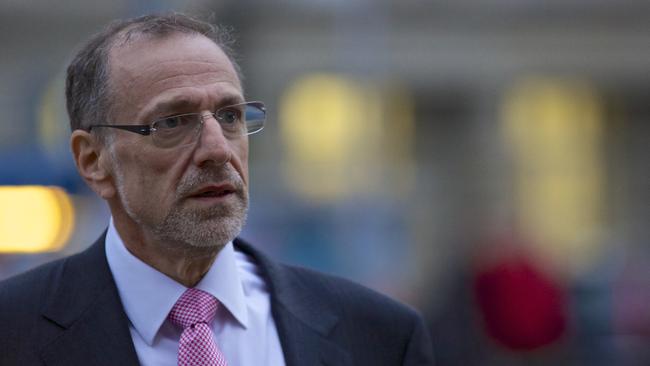
Mr. Davis said he realised the strength of the move toward greener fuels several years ago as global leaders criticised the Trump administration’s environmental policies, including withdrawing the U.S. from the Paris climate accord.
“Donald Trump shone a light that there is a global consensus, that this was an inevitable direction of travel, and I wanted to be into it,” he said.
Mr. Davis’s new fund Vision Blue Resources Ltd. has so far raised $US60 million and plans to amass a war chest of several hundred million. In its first deal, the fund recently invested $US29.5 million in NextSource Materials, which is developing a graphite mine in Madagascar.
Mr. Davis said he wants to invest in projects that he could help to bring to fruition, scale up quickly and that don’t require big investments in infrastructure, such as roads and train tracks.
He expects demand for battery metals to be driven by electric vehicles and the need to store energy from renewable sources, whose output can be volatile.
Analysts are positive about demand for battery metals. The average amount of metal in an electric-vehicle battery today is 50 kilograms to 200 kilograms, which at current costs is $500 to $2,000 per vehicle, according to Bernstein Research.
Dow Jones
5.00am:Wall Street recap
Wall Street stocks finished little changed Friday, concluding a choppy week in which optimism over coronavirus vaccines and stimulus competed with inflation fears.
Appearing at a pharmaceutical plant in Michigan, US President Joe Biden again called for Congress to boldly boost the coronavirus-ravaged US economic and enact his $1.9 trillion rescue package.
In another propitious development for markets and the country, Pfizer and BioNTech said research showed their COVID-19 vaccine could be stored at standard freezer temperatures, potentially lowering the costs and logistical challenges of widespread inoculation against the deadly virus.
But a jump in yields on 10-year US Treasury notes amid inflation worries “appears to be keeping gains in check,” said a market note from Charles Schwab.
The Dow Jones Industrial Average ended unchanged at 31,494.32. The broadbased S&P 500 slipped 0.2 per cent to 3,906.71, while the tech-rich Nasdaq Composite Index added 0.1 per cent at 13,874.46.
The Dow finished the week modestly higher, while both the S&P 500 and Nasdaq declined.
Among individual companies, Deere & Co. jumped almost 10 per cent after reporting that quarterly profits more than doubled to $1.2 billion amid improvement in the agricultural and construction sectors.
NXP Semiconductors rose 3.1 per cent, recovering from some losses earlier in the week after announcing that the Texas power crisis forced it to idle two plants in Austin.
Another chip company, Applied Materials, jumped 5.3 per cent after reporting higher profits and revenues amid strong demand.
AFP

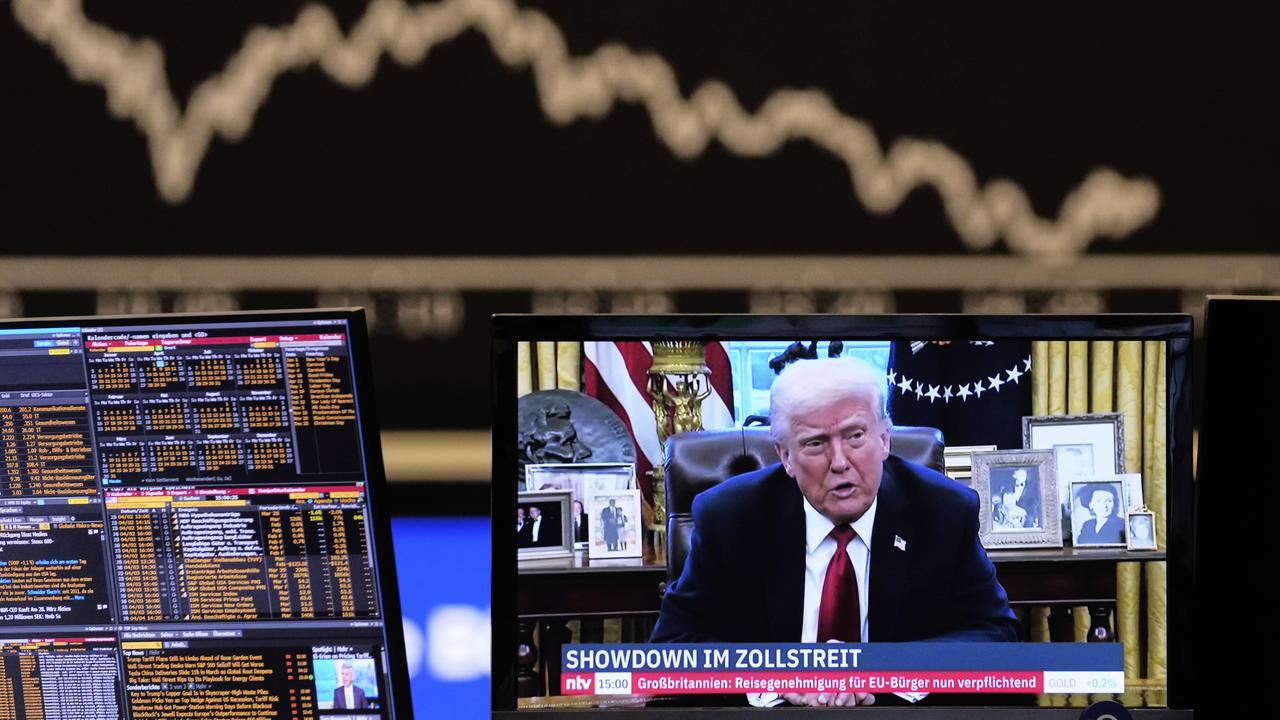

To join the conversation, please log in. Don't have an account? Register
Join the conversation, you are commenting as Logout